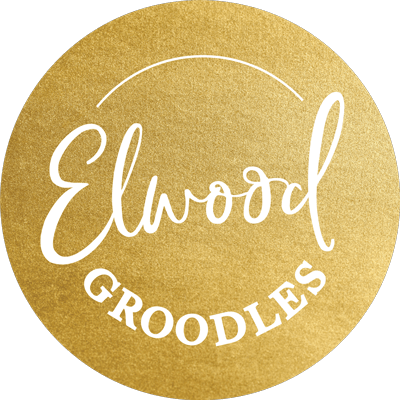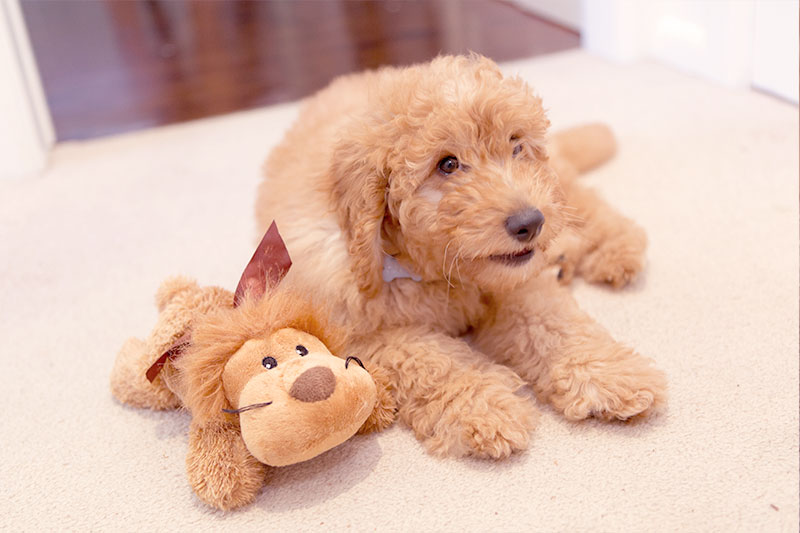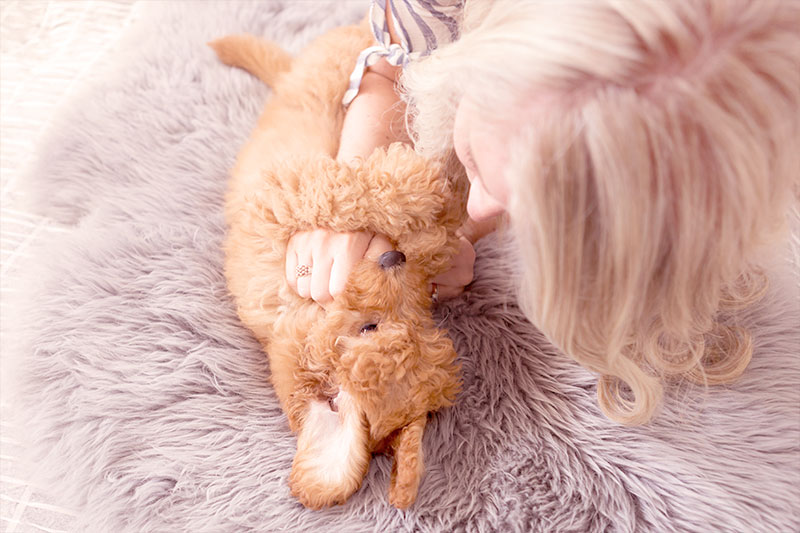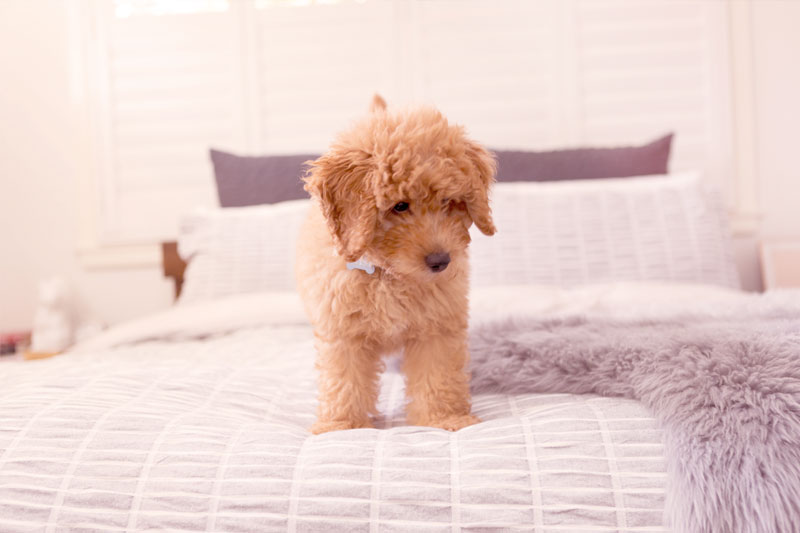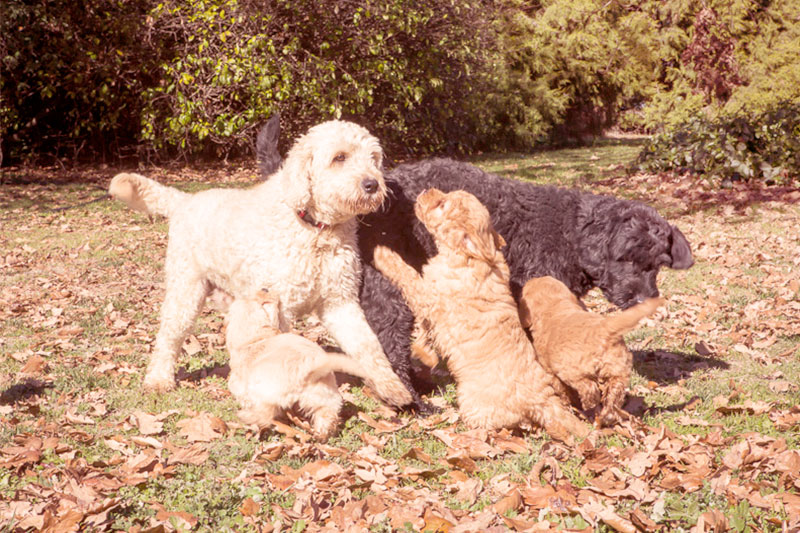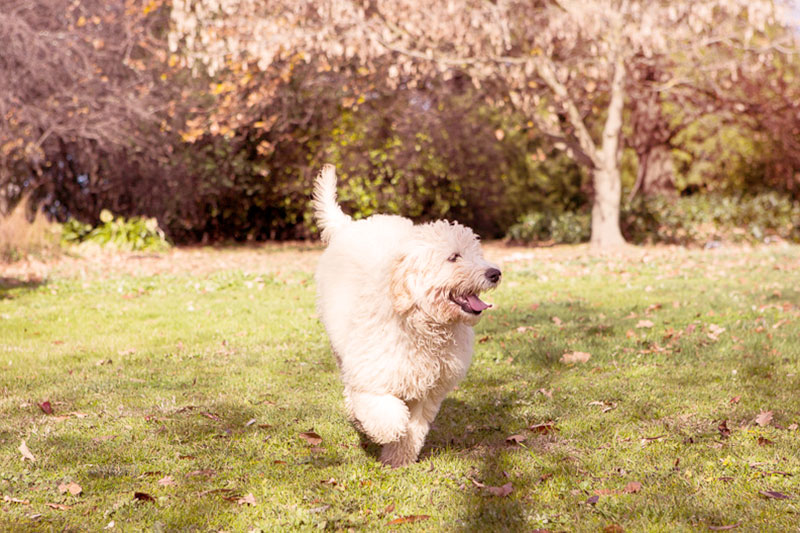Caring for your Groodle Puppy
Bringing Your Puppy Home
Introducing your puppy to the home environment is an exciting time, and marks the beginning of your new relationship, and caring for your Groodle puppy. It will be rewarding, but also trying in the early days. If this is your first time owning a puppy, be prepared for advances and setbacks, laughter and some frustrations. The time you spend loving your puppy and teaching them about your home and expectations will pay dividends in the long run.
The first thing you’ll need to do when you get home is show your puppy where it needs to relieve itself (generally out on the grass).
For more tips like the below, be sure to read our Preparation page.
For more tips like the below, be sure to read our Preparation page. Caring for your Groodle puppy entails:
KEEPING PUPPY SAFE AT HOME
The following are things you should do prior to arriving home with your new puppy:
- Remove or restrict access to plants that are dangerous to dogs
- Ensure cleaners and chemicals are beyond puppy’s reach
- Elevate or store breakable items
- Make sure the puppy can’t access electrical cords
- Fence off pools/spas and cover water features. Note that many pool fences won’t stop a puppy getting through or under, so you may need to add additional barriers.
- Limit access to children’s toys, as some parts may be small enough for the puppy to swallow
- Pools or hot tubs need to be fenced off to have a protective cover over them.
IMPORTANT INFORMATION FOR BRINGING YOUR NEW PUPPY HOME
Transitioning to a new environment can be quite stressful for a puppy. It is important to reduce stress. There are a few things you can do to help with this:
- Avoid major dietary changes (we will provide information on current diet)
- Don’t overtire the puppy
- Let the puppy have undisturbed sleeping and rest periods
- Confine your puppy when it is by itself, so it doesn’t get lost or into trouble
- Let your puppy have the company of people as much as possible
- Let your puppy explore your home
- Let your puppy get used to its family before introducing it to new people
- Provide your puppy with fresh water at all times
- Stick to the recommended puppy diet guide
- Always mix the mince and dried food together so all the meal gets eaten
- Put your puppy somewhere quiet so it can eat without distractions.
You may find that the stress of a new environment can lead to:
- Your puppy losing its appetite for the first week
- Your puppy being finicky around food for the first couple of days
- Your puppy having loose stool for the first few days
- If your puppy’s stool is very loose, feed him/her some cooked rice, chicken meat, and ½ teaspoon of corn flour. Do not feed dry food, canned food, or raw meat at this time. If motions continue to be very runny for more than 48 hours, a vet should be consulted.
If your puppy has not eaten for the first 24 hours, please make contact with us.
PUPPY’S FIRST NIGHT
Your puppy has been raised in the company of its littermates and its mother. When you bring your puppy home, it should be expected that they will experience mild separation anxiety for a short period. You can help reduce this by engaging with them as much as possible and encouraging them to become familiar with your home environment.
Your puppy should be kept in an enclosed area for sleeping, and you should introduce them to this regularly. At bed time, add some soft toys and a blanket. If it is cold, you can add a hot water bottle.
Try and avoid leaving your puppy while they are upset, and when you do leave, give them a few biscuits or a chew toy to distract them. If the puppy resumes crying, simply call out to them briefly but sternly – this way they will understand that you are still around and they have not been abandoned.
PUPPY DIET GUIDE
Our puppies are fed a premium diet. It is recommended to follow the below food guide for the first 6 months of your puppy’s life. Your puppy will leave our home on a diet consisting of:
- Ivory Coat Puppy Kibble (chicken)
- Beef or chicken pet mince (raw)
Your puppy will need to be fed twice daily. Suggested meal size from 8 weeks is 1 cup of kibble and 1 cup of mince well combined. This can be increased with age.
Alternative Food Options
- On occasion, cooked rice or pasta with vegetables
- Raw eggs to maintain a lustrous coat
- Yoghurt (natural type) to help digestive balance
- Bones whilst they are teething
- Raw chicken necks in lieu of minced beef from 3 months.
It is our recommendation that you avoid feeding your puppy processed and canned foods as much as possible. Starting your puppy on a healthy diet means you will see ongoing benefits as the dog matures. Raw natural foods are the best kind to be feeding your dog.
EXERCISE
A Groodle needs a moderate level of exercise as an adult. This can include lead walking, free running, ball retrieving, or swimming. You should aim for a minimum of 45 minutes exercise daily for your adult Groodle, and 15-30 minutes for puppies from 3-12 months. It is important to avoid over-exercising young dogs, as this could damage the puppy’s skeleton. Suggested daily exercise could include walking, playing in the backyard with the family, going to the dog park, or going for a swim.
PUPPY PRESCHOOL
Many families find puppy preschool very worthwhile for them and their dog. You can read more about puppy preschool on our Training page.
TOILET TRAINING
Toilet Training your puppy or dog takes time and patience and, just as with children, every puppy or dog is different and will learn at their own pace. To make the process of toilet training successful and as efficient as possible, you need to use reward-based positive reinforcement training. The first step is to give your dog plenty of opportunities to go outside. The second is to reward the dog every time (or as often as possible) they toilet in the place where you want the dog to go.
For more on toilet training, see our Training Page.
EAR AND NAIL CARE
Examining your Groodles’ ears regularly is important as the structure of the ear is ‘floppy’, and in some instances this does not allow for adequate ventilation. It is encouraged to clean the ears weekly with a wet wipe to keep them free from infection.
You can begin clipping your puppy’s nails from 10 weeks of age, as the nails during puppyhood can be very sharp. Most adult dogs that have an active lifestyle do not require routine nail trimming. If and when they do need a trim, you may do this yourself with specialised clippers, or have a professional do it for you.
OTHER INSTRUCTIONS
- At 5 months of age, you can change to adult dry food instead of a raw diet. Make sure the protein level is under 20%.
- Bones are incredibly good fibre for your puppy while teething.
- Raw chicken necks are a good alternative to minced beef from 12 weeks of age.
- Slow development of your puppy is best. If your puppy is slow to mature and not overweight during development, the chances of hip and elbow dysplasia are greatly reduced.
- Avoid all food high in preservatives and colouring as these can cause skin irritations and other problems. Avoid high protein and high mineral foods (such as Lams, Hills Science Diet, Advance, Proplan or Royal Canine).
Remember, if you give your puppy a healthy diet when young, you will reap the benefits during maturity!
IMPORTANT INFORMATION
Transitioning to a new environment can be quite stressful for a puppy. It is important to reduce stress as it can predispose your puppy to illness. There a few things you can do to help with this:
- Avoid major dietary changes
- Don’t overtire the puppy
- Let the puppy have undisturbed sleeping and rest periods
- Confine your puppy when it is by itself so it doesn’t get lost or into trouble
- Let your puppy have the company of people as much as possible
- Let your puppy explore your home
- Let your puppy get used to its family before introducing it to new people
- Provide your puppy with fresh water at all times
- Stick to the recommended puppy diet guide
- Always mix the mince and dried food together so all the meal gets eaten
- Put your puppy somewhere quiet so it can eat without distractions.
You may find that the stress of a new environment can lead to:
- Your puppy losing its appetite for the first week
- Your puppy being finicky around food for the first couple of days, and
- Your puppy having loose stool for the first few days.
- If your puppy has not eaten for the first 24 hours, please contact me.
If your puppy’s stool is very loose, feed him/her some cooked rice, chicken meat, and ½ teaspoon of corn flour. Do not feed dry food, canned food, or raw meat at this time. If motions continue to be very runny for more than 48 hours, a vet should be consulted.
